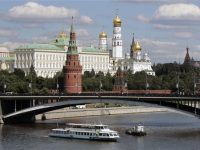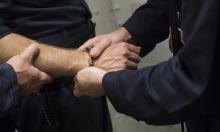Ten people that changed the world in 2013
Pravda.Ru is offering its list of top ten most interesting politicians of 2013 who defy the saying: "One man is no man." These political leaders exhibited personal courage and performed extraordinary acts that are far from conventional and are well respected at home and paid attention to by the rest of the world.

1. Russian President Vladimir Putin deserved the Nobel Peace Prize awarded to the UN Organization for the destruction of chemical weapons for a solution to the Syrian crisis. A former employee of the security services in the administration of U.S. Presidents Nixon, Ford and Reagan, Kathleen Troia McFarland wrote that in one of the most skillful diplomatic maneuvers of all time, Russian President Putin saved the world from almost certain death. The assistance Putin offered to Ukraine in time and without pathos will stabilize the situation in the country and in the future will get it out of stagnation. The President granted political asylum to a former CIA agent Edward Snowden, which resulted in numerous diplomatic problems and loss of image for Russia's geopolitical opponent - the United States. In late December, Putin has launched the EEC that will commence its work on January 1, 2015, and signed an essential part of the agreement with Kazakhstan and Belarus. Pardoning Mikhail Khodorkovsky and forcing business tycoons out of offshore shadows he eliminated such concept as "Russian oligarchs." The President ratified the infamous law prohibiting propaganda of homosexuality, supporting Russian and traditional Christian values.
2. Nicolas Maduro won the presidential election in Venezuela without any political capital, not to mention the famous charisma of his predecessor Hugo Chavez. Further actions of the Venezuelan President showed that his is an extraordinary and smart person. He managed to mobilize the Venezuelans to continue Chavez's course towards a socially-oriented state despite the fact that 80 percent of media in Venezuela belong to the opposition. Parliament gave him special powers that let him issue decrees to deal with the "economic war" waged by the opponents. Maduro's first law was the law limiting commercial profit. The goal is to ensure state control over the import and distribution of consumer products. For the first time in many years prices in Venezuela went down. As a result, the ruling party won the municipal elections. "I've never voted for Chavez, but I admit that Maduro has done more for the fight against speculators than Chavez in 14 years," a housewife told AP.
3. Former NSA agent Edward Snowden became known throughout the world by exposing the secret activities of the U.S. government and its unprecedented surveillance. This became the basis for long discussions of growing capabilities of modern electronic intelligence. The true extent of espionage was revealed, from ordinary Americans to Presidents of allied countries. One of the U.S. federal judges declared wiretapping unconstitutional. Prism and other programs became subject of a detailed investigation by the European Parliament and prompted countries to develop their own online systems bypassing the American one. Six months after the revelations Snowden came to a conclusion that in terms of personal satisfaction his mission was accomplished, and he considered himself a winner. He was nominated for the Sakharov Prize and a suggestion was made to include his name in the list of candidates for the Nobel Peace Prize "for his heroism." Edward Snowden was successful in his choice of Russia as a political asylum. This is the only place where he will be safe form the revenge of the U.S. intelligence.
4. General and Defense Minister of Egypt Abdul Fattah Al-Sisi is the man who kept the country in his hands. He acted decisively and consistently without fear of accusations of violating the restriction of freedoms and democracy. In July, Al-Sisi announced the overthrow of the president and the suspension of the constitution. Mohamed Mursi was detained, and other leaders of the "Muslim Brotherhood" movement were arrested. After the coup, the country was headed by an interim government supported by the general. From time to time he introduces martial order and nips unrests in the bud. The activity of the "Brotherhood" was outlawed by court, and in early October the organization announced its dissolution. In December, after a terrorist attack in the city of Mansoura, the movement was declared a terrorist organization and Mursi will stand trial on charges of inciting violence, treason, death of protesters at the presidential palace in 2012 and as incitement to violence, espionage and terrorist training operations together with foreign organizations Hamas and Hezbollah. Surprisingly, the West did not go further than expressing its "regret."
5. Syrian President Bashar al-Assad has not only survived under unprecedented pressure from the West, but also emerged as an informal winner of the war with the support of an efficient army and 70 percent of the population, mostly Sunnis, that are not co-religionists. It is this broad popular support that was key to his ultimate military success. Assad should be given credit for flexibility and willingness to negotiate about the destruction of a stockpile of chemical weapons that he believed to be a deterrent of Western aggression. The Syrian President has been weakening terrorists for the past two years, and this year he managed to ensure significant deterioration of the positions of radicals. We can assume that in the next year he will also make the list of the most interesting politicians in the world because of the upcoming presidential elections that many analysts expect him to win.
6. German Chancellor Angela Merkel has proven that she was the most important person in Europe this year. In December she was elected to the highest post in the country for the third consecutive term. Before that, in October, as the chairwoman of the Christian Democratic Union (CDU) she won the parliamentary elections. Merkel heads a "grand coalition" that, in addition to the conservative CDU / CSU includes her opponent in the elections, the Social Democratic Party of Germany. The Chancellor was a victim of NSA spying, strongly protested it, and initiated a draft resolution on strengthening the United Nations protection of privacy subsequently adopted by the General Assembly. Merkel took an active part in the liberation of Khodorkovsky who thanked her for it. She is sticking to her plan to federalize the EU and reaping the fruits of the austerity policy for indebted countries funded by German banks. Her open support for Klitschko is interference in the internal policy of Ukraine, but Merkel clearly stays away from the areas that Germany does not want to be involved with - Syria, Libya, Iran. When it comes to new markets for Germany Frau Merkel is very active.
7. Pope Benedict XVI early in the year has resigned "for health reasons." The reason behind the resignation is unprecedented cases in the modern history of the Roman Catholic Church. His unexpected decision demonstrates his courage and inner honesty because both Catholicism and the entire world have problems whose solution requires Herculean efforts. The nature of these problems is evidenced by secret incriminating information leaked into media on the eve of the Pope's resignation. It is unlikely that we will soon know the entire truth about the Vatican, but one of the areas of struggle for the papal seat was the control of the Vatican Bank whose assets amount to an estimated $2 trillion. One of Obama's aides openly said that after the "Arab Spring" there will be a "Vatican spring." This is precisely what has happened. The next day after the resignation of Pope Benedict XVI, a lightning struck the dome of St. Peter's Basilica in the Vatican. The former Pope now lives in seclusion in the Vatican.
8. Angolan President Jose Eduardo dos Santos with his party "People's Movement for the Liberation of Angola - Labor Party" (MPLA) has confidently won the general election. The 71-year-old politician has been ruling the country for 33 years, and remained head of state for another five years. He entered into a direct confrontation with Portugal over never-ending allegations of corruption. Dos Santos announced that the relationship with the former metropolis were no longer those of partnership. President chose uncommon methods of fighting Islamic radicalism by shutting down mosques. From the point of view of the law there is nothing wrong with it. According to the law on religious rites of Angola from 2004, Islamic communities can open their houses of worship only if they prove the existence of a minimum number of believers of 100, 000 people and presence on the territory of two-thirds of the country. The President provides Angola with political stability, investment and economic growth. In December Angola denied reports that Dos Santos was undergoing treatment for cancer.
9. Israeli Foreign Minister Avigdor Lieberman triumphantly returned to his post after 17 years of investigations and trials. The Minister took the initiative signing for the Customs Union free trade zone and expressed doubts that the United States was a strategic partner for Israel. He advised the Israelis to look for them in other countries, and we can guess which ones specifically. Avigdor Lieberman, apparently, has far-reaching plans and has repeatedly stated that he was quite willing to take the post of prime minister. In elections to the Knesset, Lieberman's Party gathered what is called a controlling stake, and without it, it is impossible to form a government. The Minister is the most senior citizen of Israel among those who at one time was repatriated from the Soviet Union.
10. Manuel Valls, French Interior Minister, according to MetroNews was recognized in his country as the best politician of the year for the strength of character and loyalty to principles. He is the only politician who speaks about really pressing French problems such as uncontrolled immigration and rising crime. Valls, who, according to a French official "supports President Francois Hollande like a rope supports a hung man" stated that it was necessary to revise the country's migration policy in relation to Africans and questioned the compatibility of Islam and democracy. He said that the Roma could never blend into French society and promised to pursue a policy of mass deportation.
According to other polls, his stance on deportation of an Albanian schoolgirl was supported by 74 percent of the French, and in the next presidential election they would like to see Valls rather than the current leader Hollande as a candidate from the Socialist Party.
Lyuba Lulko
Pravda.Ru
Subscribe to Pravda.Ru Telegram channel, Facebook, RSS!


